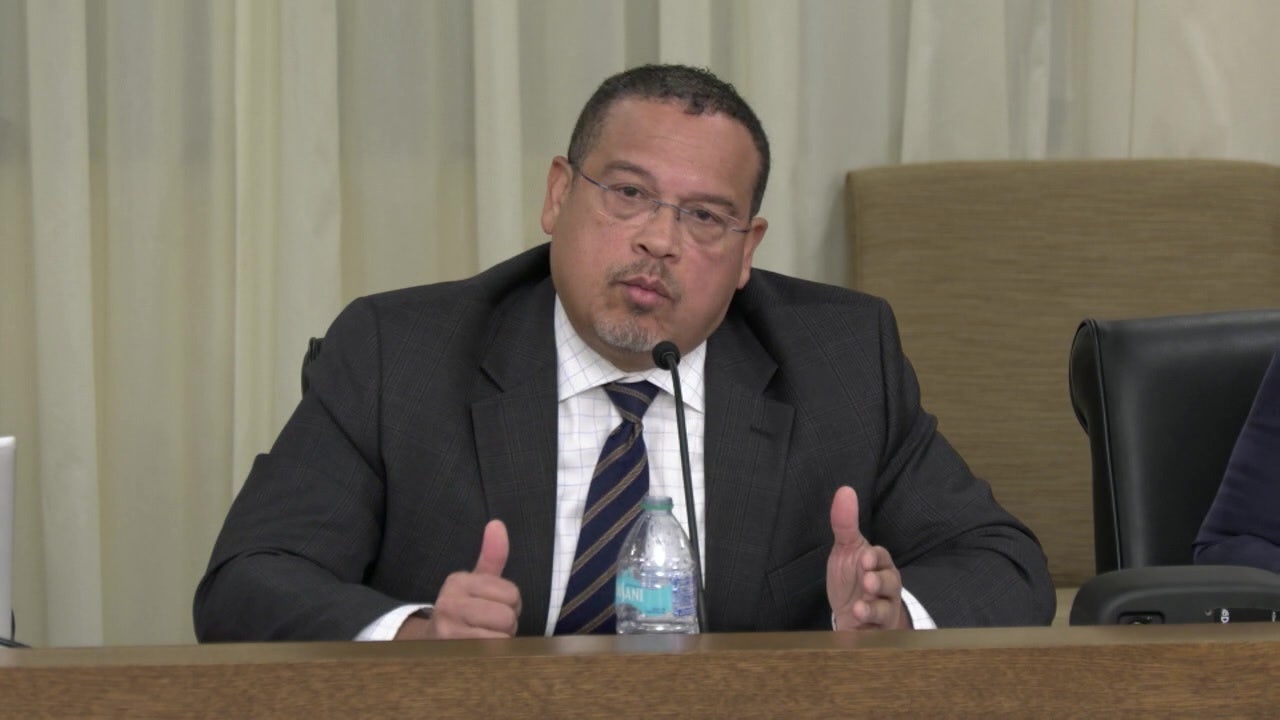Finance
Albany Dems push ‘shameful’ public campaign finance bill ahead of 2023 session end

ALBANY – Democratic state lawmakers are expected to pass legislation before leaving the Capitol for the year that just so happens to help incumbent pols fight off future rivals.
The bill would overhaul the public campaign finance system by allowing all political contributions within a legislator’s district to get matched at taxpayer expense up to $250.
Potential challenges would also face tougher restrictions to qualify for the nascent program.
“This shameful bill inflicts huge damage on New York’s historic small donor matching law and is completely counter to the law’s goal of giving the average New Yorker a stronger voice in our democracy,” government watchdog Reinvent Albany said in a statement.
Democratic supermajorities in the state Senate and Assembly are expected to approve the controversial bill by Saturday despite opposition from good government groups.
Albany Democrats approved plans for a public campaign finance system, which would eventually include legislators and statewide offices, in 2019 to supposedly make it easier for people to run for office without the help of deep-pocketed donors and other political gatekeepers.
Allowing all donations to get matched no matter how large means upstart candidates will no longer enjoy such a big boost compared to more entrenched pols, according to New York Public Interest Research Group Executive Director Blair Horner.
“Public financing really helps challengers more than incumbents generally. And so if you’re undermining the program, you’re helping incumbents by extension,” he told The Post.

Current law allows six-to-one matches for political contributions of $250 and below so that $100 from a donor becomes $700 for a candidate.
State Sen. Zellnor Myrie (D-Brooklyn) and Assemblywoman Latrice Walker (D-Brooklyn), who are sponsoring the bill in their respective chambers, did not provide comment Thursday.
The proposal would make the public campaign finance system more effective in the end, according to Mike Murphy, a spokesman for state Senate Majority Leader Andrea Stewart-Cousins (D-Yonkers), said.
“With a Supreme Court determined to erode democracy and expand the influence of shadowy big-money in politics, New York has taken the lead by standing up the most ambitious public campaign finance programs in the nation,” he said.

This new system will amplify the voice of small donors and improve transparency in elections. These updates will ensure the program’s first year is a success and bring the state’s participation and eligibility standards in line with New York City’s campaign finance system, one of the most well-regarded local programs in the country.”
A spokesman for Assembly Speaker Carl Heastie (D-Bronx) did not respond to a request for comment.
“I’m not in a position now to say yes or no to any particular piece of legislation,” Gov. Kathy Hochul told reporters in Albany on Wednesday when asked whether she would sign the proposal into law if passed by the state Legislature.

Democrats have also faced criticism for pushing another purportedly partisan bill to move local elections outside New York City from odd to even-numbered years when races for governor and president tend to boost turnout, which tends to disadvantage Republicans.
“When voters are engaged, we end up with more representative local governments,” state Sen. James Skoufis (D-New Windsor) tweeted Wednesday about the bill he is sponsoring.
“The data shows us that simplifying our elections calendar to even years improves turnout on both sides of the aisle and will ultimately save taxpayers money down the line–a win-win.”
Horner said the public will hardly benefit from pending plans for passing the two bills with little public input on the final scheduled week of the 2023 legislative session.
“This is a classic Albany deal, right at the last minute, no public comment process, no hearings, no even discussion about what’s wrong with the system,” Horner said of the public campaign finance bill.
“Waiting for the last minute to jam changes through – that is classic Albany last-minute dealmaking and usually when that happens, it’s not in the public’s best interest.”

Finance
Financial surveillance threatens California border businesses

Many people do business in cash. They pay rent, go shopping, or wire money to relatives without government surveillance. But now, under a new federal directive targeting neighborhoods near the Southern Border, different rules apply.
Esperanza Gomez owns Novedades y Servicios, a small storefront offering entirely legal and legitimate money services to people who use cash. Normally, anytime a customer wants to do anything over $10,000—like cash a check, get a money order, or wire money—businesses that help them must record sensitive personal information, including the customer’s Social Security number, and report it to the federal government.
But starting on April 14, 2025, the government lowered that threshold to just $200. Previously, Gomez never had to make these reports because her customers’ transactions are always under $10,000. But because of the new rule, she suddenly must report nearly every transaction to the feds.
Many customers do not want the government to get a report every time they cash a check to buy groceries, diapers, or clothes at the stores across the way from Gomez’s shop. “My customers are honest people who are trying to live their lives,” she says, “Many do not have bank accounts, and they need these services. They don’t understand why this is required.”
What’s more, the new law only applies to 20 ZIP codes in Texas and 10 in California across Imperial and San Diego Counties. Everywhere else, the federal reporting standard remains $10,000. Actual criminals—if they really need to move money in $200 increments—can just go to a San Diego ZIP code not targeted by the new rule or head north toward Orange and Riverside counties.
Left behind will be small-business owners like Gomez and her customers who lack mobility.
The burden of compliance with the new law threatens to drive Gomez out of business. She will need more hours than she has in the day to complete the required paperwork. Penalties for a missed report top $70,000.
For a one-person store like Novedades y Servicios, this new surveillance regime is both business-crushing and a huge invasion of financial privacy. “I’ve always followed the law and will continue to do so,” Gomez says. “But this would be so costly that it would probably put me out of business.”
The government says the order is temporary—expiring in September—but past surveillance orders issued by the same federal agency have been repeatedly renewed past their expiration dates. Some have eventually been expanded to cover the entire country.
Rather than go away quietly, Gomez filed a federal lawsuit on April 15, 2025. Our public interest law firm, the Institute for Justice, represents her. For now, at least, she can breathe easy. The U.S. District Court for the Southern District of California issued a temporary restraining order on April 22, pausing enforcement for a short period while the court considers more permanent relief.
We also represent Texas business owner Arnoldo Gonzalez, Jr., in a separate case. A court in Texas court paused the new surveillance rules for the companies in that case, but other Texas businesses still must comply.
The underlying issues are the same in both cases. Unlimited surveillance violates the Fourth Amendment, which guarantees people’s right to be secure against unreasonable searches and seizures.
Finance
Non-bank financial institutions’ reliance on banks for contingent credit under stress and its consequences
In recent years, banks’ credit line exposure to ‘shadow banks’, or non-bank financial institutions (NBFIs), has grown significantly faster than exposure to non-financial corporations. Between 2013 and 2023, bank credit lines to NBFIs tripled from $500 billion to $1.5 trillion, and in 2023 over 20% of all bank credit lines were committed to NBFIs (Acharya et al. 2024). How do the growing linkages between banks and NBFIs impact the performance and systemic stability of banks? We answer this question by studying an important leading example of a non-bank financial institution – real estate investment trusts (REITs; Acharya et al. 2025).
REITs are significant investors in commercial real estate (CRE), with over $4 trillion in investments, corresponding to 20% of the CRE market that is currently valued at $21 trillion.
Rising interest rates and an economic slowdown can therefore exert considerable pressure on the CRE sector.
Considering the vast scale of the CRE market, disruptions in the CRE sector can influence the availability of bank credit to households and businesses. Consequently, regulators and policymakers have increasingly focused on the risks associated with CRE loans in recent times. REITs, being large CRE investors, inherit these fundamental economic and financial risks.
Importantly, nearly half of all bank-originated credit lines to public NBFIs are allocated to REITs. As shown in Figure 1, REITs exhibit significantly higher utilisation rates on bank credit lines compared to other NBFIs and non-financial corporates. Moreover, their credit line usage is markedly more sensitive to aggregate market performance, as indicated by the slope coefficients in the figure. Notably, REIT utilisation rates spike during periods of market stress (such as the COVID-19 period), making credit lines to REITs a potentially significant source of systemic risk for banks.
However, despite these factors, the significant exposure of large banks to the CRE sector via their credit lines to REITs is often underappreciated. It is commonly assumed that disruptions in the CRE sector mainly affect smaller banks. Figure 2 illustrates the on-balance-sheet exposure in the form of CRE loans as a proportion of total equity over the past decade for three types of banks: community banks (assets under $10 billion), regional banks (assets between $10 billion and $100 billion), and large banks (assets exceeding $100 billion). The exposure of regional and community banks, when scaled by equity, is approximately four and five times greater, respectively, than that of large banks. As per this exposure measure, there has been a notable increase over the past decade in CRE loan exposure among regional and, especially, community banks, but not among large banks. This might suggest that the CRE stress does not pose systemic risk to the largest banks in the economy.
Figure 1 Average credit line utilisation by borrower group
Notes: This figure plots the average credit line utilisation rate by three groups of borrowers – REITs, NBFIs (excluding REITs), and non-financial companies – versus the S&P 500 return. Each dot indicates the utilisation rate in one of the quarters between 2005Q1 and 2023Q4. The dots for 2008Q4 and 2020Q1 are labelled to highlight the main crisis quarters. The solid blue line indicates the slope of a regression of utilisation rates onto the S&P 500 return for REITs, the dashed red line and the green dotted line indicate the respective slopes of the same regression for NBFIs excluding REITs and non-financial companies. Data are obtained from Capital IQ and CRSP.
However, these figures ignore loans and credit lines provided by banks to REITs. The primary conclusion that emerges from our empirical analysis is that to get a complete picture of bank exposure to CRE risks, it is important to focus not just on the direct CRE exposure of banks but also on the provision of credit, especially by large banks, to REITs. Once the indirect exposure of banks via term loans and credit lines to REITs is accounted for, CRE exposures are concentrated not only in the portfolios of smaller banks but also among the largest US banks. Figure 3 illustrates this fact. In this figure, we categorise bank exposure into direct CRE exposure, indirect exposure via term loans to REITs, and indirect exposure through credit lines to REITs. For large banks, indirect exposure constitutes about a third of their total exposure, whereas for regional banks, the indirect exposure through REITs is considerably smaller, and for community banks, it is practically negligible.
Figure 2 Total on-balance-sheet exposure to the commercial real estate market
Notes: This figure shows the total reported on-balance sheet exposure to the commercial real estate market scaled by the total book value of equity of the bank. Data are from the FR Y-C at the quarterly frequency from 2013Q1 to 2023Q4. We split banks into three types: community banks (assets
Figure 3 Total exposure of banks to commercial real estate
Notes: This figure shows the total exposure of banks to commercial real estate (CRE) by stacking their direct exposure through on-balance sheet CRE loans and indirect exposure through banks’ term loans and credit lines to Real Estate Investment Trusts (REITs). Banks are classified as follows: community banks (assets
What, then, are the underlying mechanisms through which credit-line exposure of banks to REITs might pose a system-wide risk? In summary, there is a higher utilisation rate of credit lines by REITs relative to other NBFIs and non-financial corporates, especially when the performance of the underlying real estate assets declines and particularly during periods of aggregate economic stress. This behaviour is associated with a notable decrease in stock returns for banks more heavily exposed to undrawn credit lines extended to REITs, consistent with capital encumbrance imposed by credit line drawdowns impeding banks’ future intermediation activities.
We first tease out why REITs have higher utilisation rates on credit lines, especially during stress. By regulation, REITs are required to pay out at least 90% of their income in the form of dividends, restricting the amount of cash REITs can accumulate.
This leads to a disproportionately large dependence of REITs on bank credit lines for liquidity during stress periods. For example, Blackstone REIT (BREIT) and SREIT (managed by Starwood Capital) relied on their lines of credit during 2022 and 2024 respectively, nearly exhausting their credit line capacity to satisfy investor withdrawal requests.
We show that the findings in these case studies generalise to a broader setting in which we find significant positive correlations between redemptions and credit line drawdowns for all REITs in our sample. We also find that REITs increase investments and dividend payouts and reduce cash in the four quarters after a drawdown. This seems to indicate that they use both their cash and the liquidity from credit lines to acquire properties and pay out dividends. During crises (Global Crisis and COVID-19) however, we find that REITs start building cash buffers and they discontinue investing, i.e. acquiring properties. In fact, 72 cents of each dollar drawn is used to increase cash holdings. In other words, REITs use bank credit lines like ‘working capital’ for business activities in normal times, but to hoard cash during stress times.
We next investigate the impact of higher credit line utilisation by REITs on banks. Unlike term loan exposures that banks report on their balance sheet and fund with capital, and whose potential risks they manage through loan loss provisions, credit lines are off-balance-sheet and funded with equity capital to a much lesser extent until drawn down. Moreover, the risk of simultaneous drawdowns by borrowers during widespread market stress may suddenly constrain bank capital and/or liquidity, thereby reducing the banks’ ability to intermediate effectively. Consistent with these channels, we find that banks with higher undrawn credit line commitments to REITs experience lower stock returns during crises (controlling for banks’ total credit line commitments).
Finally, we document that credit lines to REITs substantially increase banks’ capital requirements during aggregate stress periods. We estimate an expected (market-equity-based) capital shortfall under aggregate market stress (e.g. -40% correction to MSCI Global Index) vis-à-vis a benchmark capital requirement (e.g. 8% of market equity relative to market equity plus non-equity liabilities), by incorporating REIT and non-REIT credit lines in stress test scenarios. We compare three models: one treating all borrowers uniformly, one distinguishing REITs by their unique drawdown behaviour, and one considering direct on-balance-sheet CRE exposure. As of Q4 2023, we estimate that the incremental capital requirement for publicly traded US banks rises by approximately 20% — from $180 billion to $217 billion — primarily due to REIT drawdowns, while CRE exposures add only $2 billion. Notably, over 90% of this additional capital burden falls on large banks. These results highlight the systemic risks posed to banks, and in turn to the real economy, by REIT credit lines, underscoring the need for careful regulatory scrutiny.
While we have focused on publicly traded REITs, this raises broader questions about the growing linkages between banks and NBFIs. Acharya et al. (2024) document that NBFI drawdowns have risen from 25% in 2013 to over 50% post‐COVID, with private NBFIs accounting for nearly 60% of drawdowns by private firms (compared to 30% for public ones). Additionally, credit lines to NBFIs such as business development companies (BDCs) and collateralised loan obligations (CLOs) have increased from 28% to 42% of total bank credit to NBFIs between 2013 and 2023. Given that private NBFIs generally exhibit higher credit line utilisation rates than REITs, stress in their funding conditions could similarly affect banks via the credit line channel. In essence, as NBFIs continue to expand their role in credit intermediation, their continuing reliance on banks for contingent liquidity highlights a critical channel through which risks may be transmitted back to the banking system.
References
Acharya, V V, N Cetorelli and B Tuckman (2024), “Where Do Banks End and NBFIs Begin?”, NBER Working Paper.
Acharya, V V, M Gopal, M Jager and S Steffen (2025), “Shadow Always Touches the Feet: Implications of Bank Credit Lines to Non-Bank Financial Intermediaries”, NBER Working Paper No. w33590.
Gupta, A, V Mittal and S Van Nieuwerburgh (2022), “Work from home and the office real estate apocalypse”, Working Paper, NYU Stern School of Business.
Hardin III, W and M Hill (2011), “Credit line availability and utilization in REITs”, Journal of Real Estate Research 33: 507–530.
Jiang, E X, G Matvos, T Piskorski and A Seru (2023), “Monetary Tightening, Commercial Real Estate Distress, and US Bank Fragility”, NBER Working Paper.
Mei, J and A Saunders (1995), “Bank risk and real estate: an asset pricing perspective”, The Journal of Real Estate Finance and Economics 10: 199–224.
Finance
Hong Kong economy to post solid growth in first quarter: finance chief Paul Chan

Hong Kong’s finance chief has predicted the economy to post solid growth in the first quarter, while pledging to press on with plans to control government spending to maintain the city’s competitiveness.
Financial Secretary Paul Chan Mo-po gave his forecast on Sunday in the lead-up to this week’s announcement of gross domestic product (GDP) figures for the quarter.
He said the economy had benefited from the increase in tourist arrivals and exports between January and March, but warned of uncertainties in the global outlook amid an ongoing trade war.
“Driven by these positive factors, the advance estimates on GDP for the first quarter of 2025 to be released this week are expected to be robust,” he said in his weekly blog.
“But looking ahead, the bullying acts and the unilateral protectionism of the United States will continue to haunt the global economic outlook.”
Chan said the number of tourist arrivals in the first quarter had increased by 9 per cent year on year to 12.2 million, thanks to a series of mega-events and large-scale international meetings that boosted the performance of the retail and catering sectors.
-
News1 week ago
Harvard would be smart to follow Hillsdale’s playbook. Trump should avoid Biden’s. | Opinion
-

 Politics7 days ago
Politics7 days agoVideo: Hegseth Attacks the Media Amid New Signal Controversy
-

 Culture5 days ago
Culture5 days agoNew Poetry Books That Lean Into Calm and Joy Amid Life’s Chaos
-
Business1 week ago
Porto's Bakery moving forward in Downtown Disney, replacing Earl of Sandwich
-

 Politics1 week ago
Politics1 week agoSupreme Court blocks new deportations of Venezuelans in Texas under 18th century Alien Enemies Act
-

 News1 week ago
News1 week agoMaps: Where Do Federal Employees Work in America?
-

 Technology1 week ago
Technology1 week agoPete Hegseth reportedly spilled Yemen attack details in another Signal chat
-

 Politics1 week ago
Politics1 week agoPope Francis and US presidents: A look back at his legacy with the nation's leaders



















